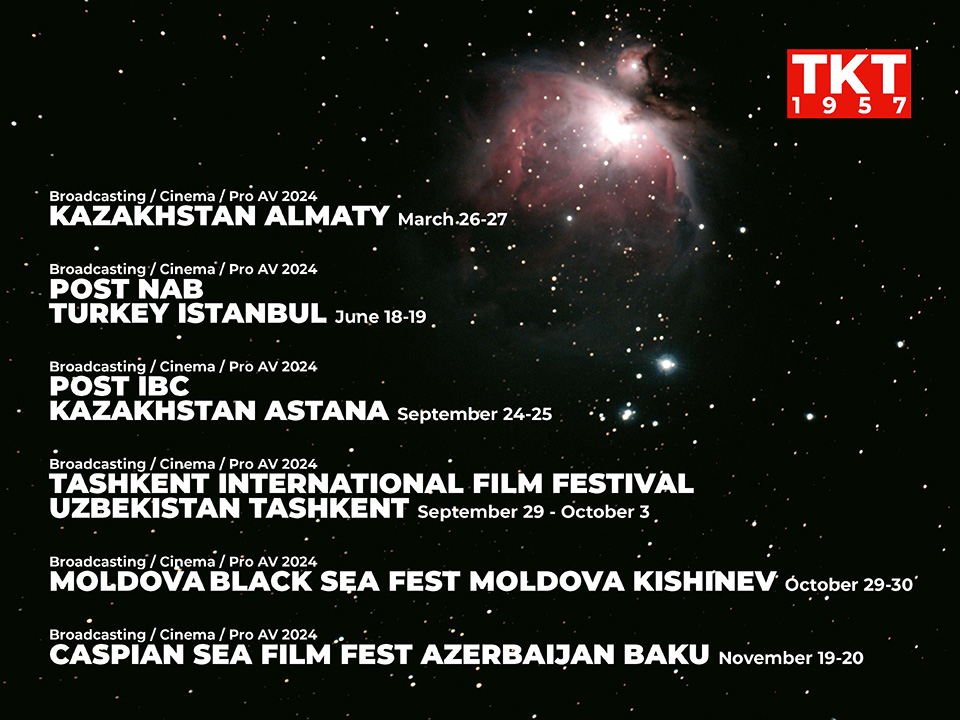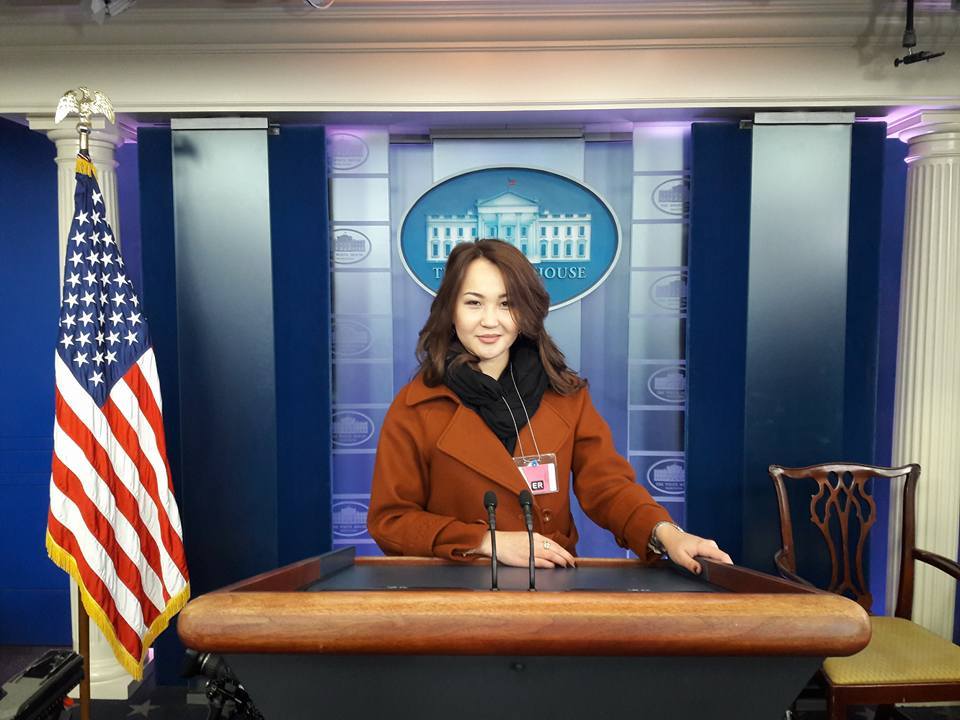Interview with media manager Aigul Adilova, Kazakhstan.
– Where and in what family were you born? What were your parents and your ancestors doing in general?
I was born in Kazakhstan, in the city of Aktobe, located in the west of our country. I was born into an ordinary family; my father is an aviation technician by profession, and my mother is an accountant. Currently, and for many years now, my father has been working as a carpenter-operator. My mother, like my father, is retired. In reality, my parents worked in various places to support their children during difficult times. In my eyes, my mother’s calling and profession are to be a mother. Everything she did and does was and is for the sake of her children.
– How did this affect you?
Unconditional parental support is extremely necessary. Now, as a mother myself, I understand how important, I would even say fundamental, this factor is in raising children, which is actually everything. When I tell my parents “I’m getting married,” their response is “we agree, we will always support any decision you make,” or “I want to move to Astana and build a career there,” “we agree, we support you.” No obstacles, just total trust, faith in their child, and in their choices. Perhaps this is what shaped me into an independent person.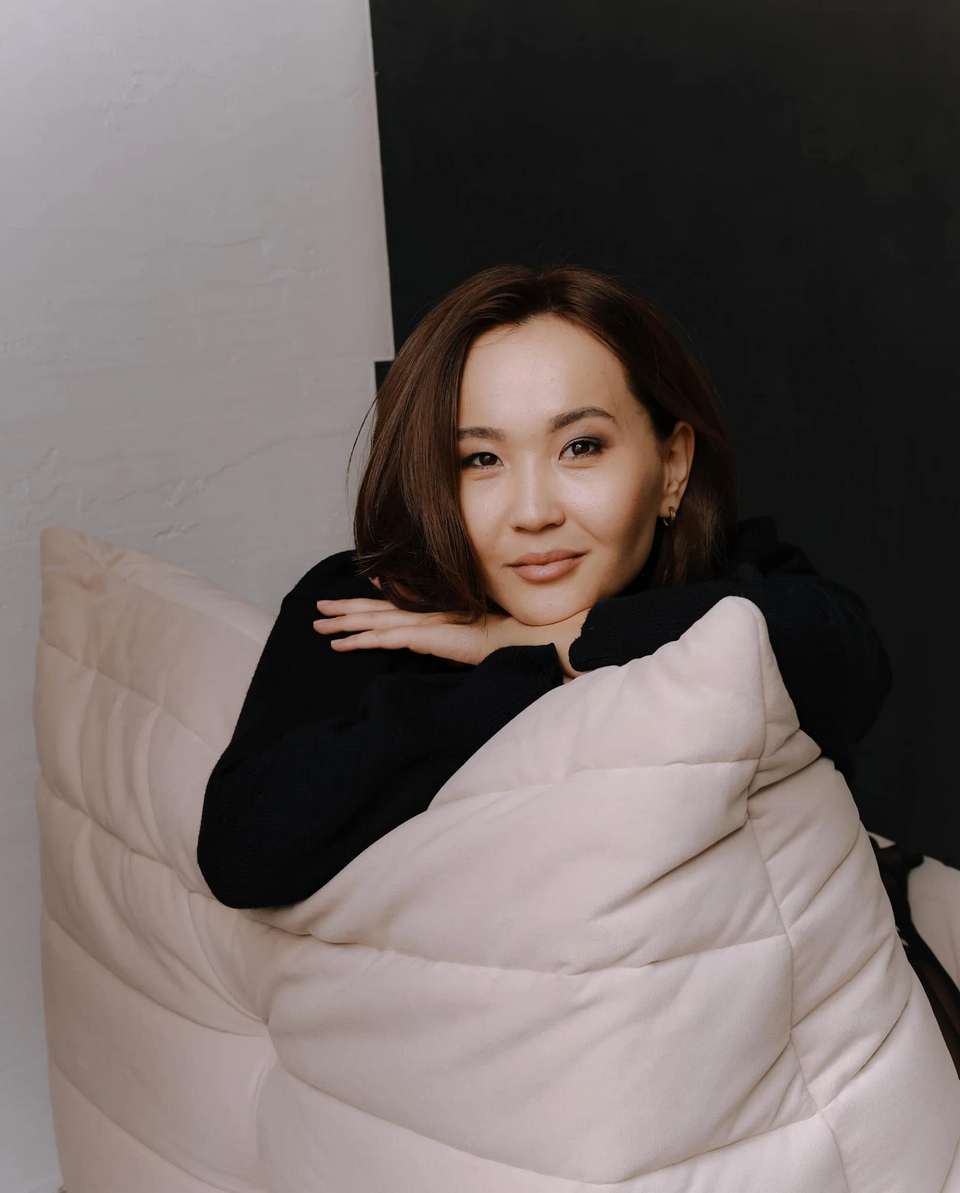
– Did your parents have higher education?
My father graduated from an aviation school in Moscow, and my mother from a technical school in southern Kazakhstan.
– Why then did he start working as a carpenter?
In the 1990s, when the Union collapsed, factories stopped, many closed down, salaries were not paid, and people literally starved; many rushed to the markets. My parents started trading cigarettes. Later, they traveled to other cities, bought clothes and groceries wholesale. My parents often took me with them. I remember going to neighboring Russia (Aktobe is a border city), buying sacks of rice, onions, and then selling them in our city markets with a markup. They traded in anything, even sunflower seeds, just to survive. During this time, we, the children of the nineties, were partly left to fend for ourselves. Nobody took care of us, didn’t take us to clubs. Frankly, adults didn’t have time for that. At that time, we moved very often because we didn’t have our own home. So it all boiled down to finding shelter and food. That’s why I attended three different schools. And at the age of 15, I saw an advertisement on the local channel about auditions for a teenage program. Since then, my life has been inseparably linked to television. I am now 34 years old, which means I have been working in television continuously for 18 years. From a reporter for a teenage program on the city channel, I grew up to be the director of a republican television channel. I think my thirst for knowledge, for books, influenced me a lot.
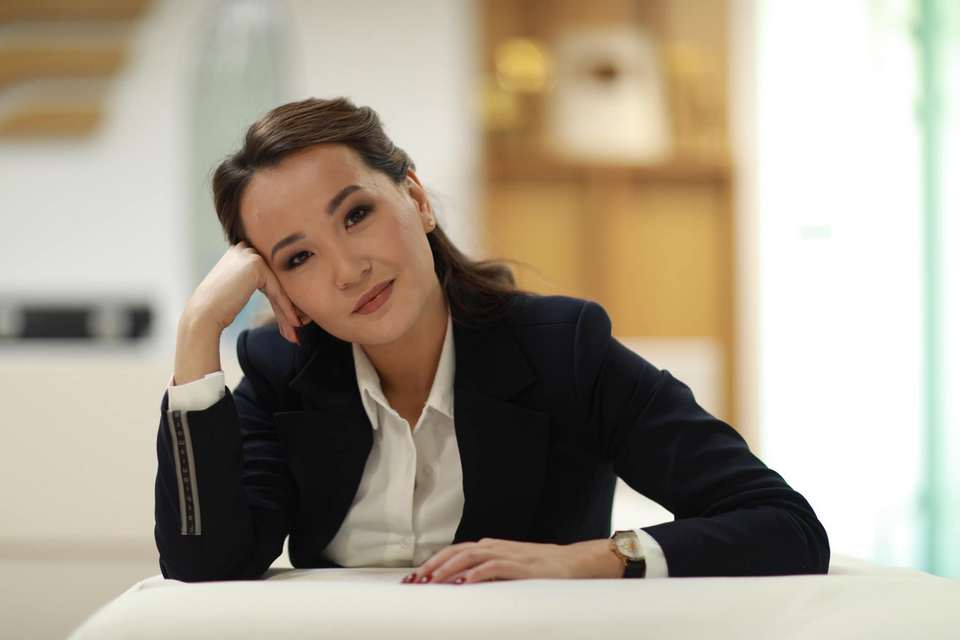
– What did you read?
I read a variety of things. Perhaps at that time, my childish brain wanted to absorb everything: fiction, world classics, books on history; I was always interested in learning about my people, about my family.
– Are you the only child in the family, or do you have siblings?
I have an older brother.
– What language did your parents speak at home?
In Russian, in Kazakh, but mostly in Russian.
– Are your parents Kazakhs, or do you come from a mixed family?
No, we are Kazakhs. Kazakh is our native language, inseparable from us, but mostly our language of communication was Russian. At the time my parents were growing up, they were born and raised in the city, there was a strong bias towards the Russian language – when their parents spoke Kazakh, and the children spoke Russian. My mother told me that she was almost the only Kazakh in her class.
– Which school did you attend? Russian or Kazakh?
I went to a Russian school.
– Did you do well in school?
Yes, I was an excellent student.
– Were you an excellent student because you worked hard or because everything came easy to you?
I was a diligent and inquisitive student. I remember always having the desire to learn, to read, to explore something new. Teachers were a source of knowledge for me. I remember literature teachers who ignited my desire to read and analyze texts. Well, and then… it was always important for me to be in the spotlight.
– When did your organizational skills start to show?
In seventh grade. Although we had a very ordinary school, it was quite active. Imagine, just an ordinary small school on the outskirts of the city, and we’re electing a president, preparing election programs, and determining the cabinet of ministers. Personally, I ran for the position of school president, was the mayor (class leader), but lost the presidential election and became the Minister of Culture and Information. I am still grateful to my school for how they developed children. A big hello and thanks to the school principal, teachers, and my class teacher!
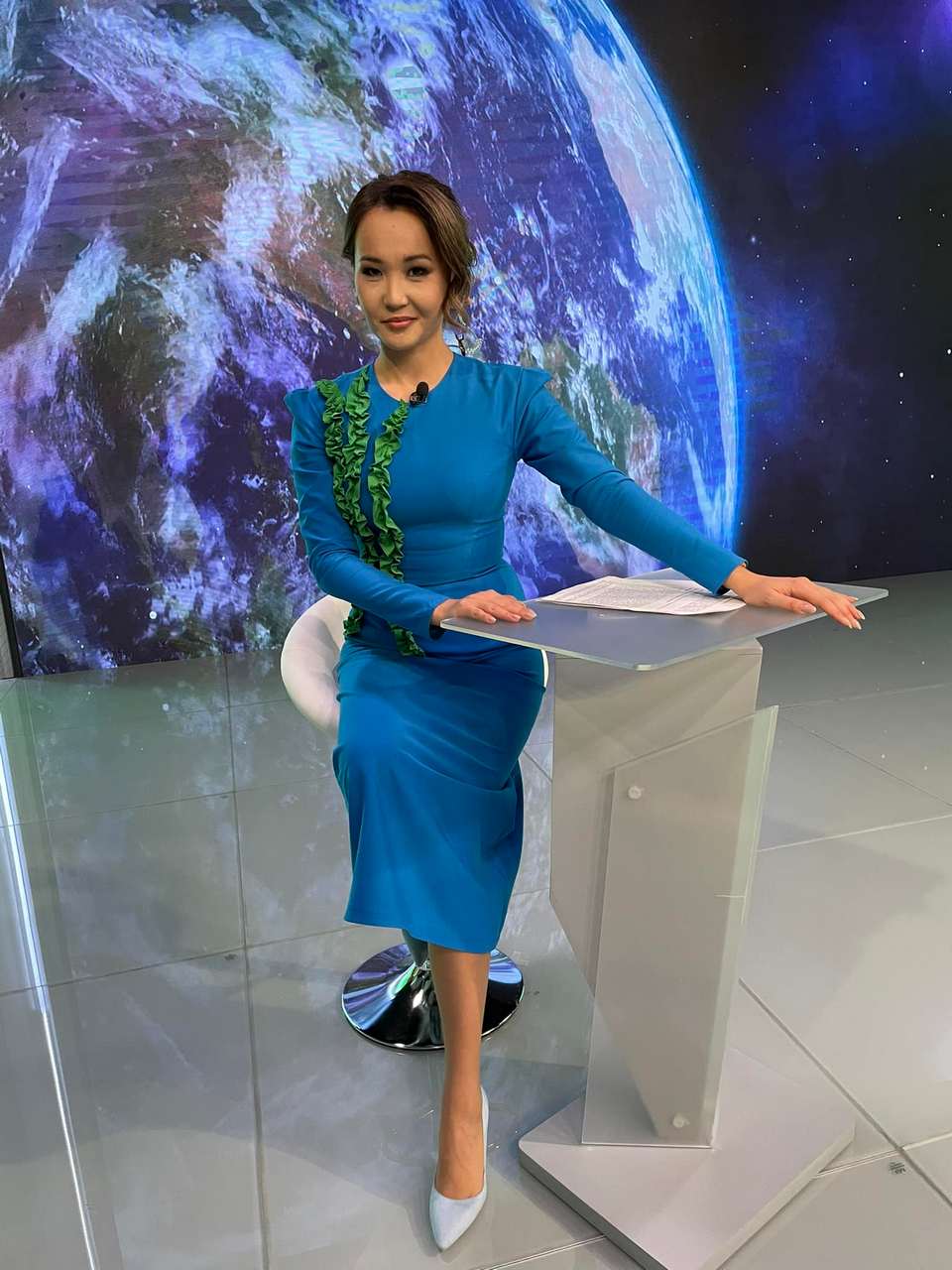
– What clubs and sections did you attend?
When I entered first grade, my parents traded at the market. In general, they survived as best they could. And as I mentioned earlier, children were left to fend for themselves. So I didn’t attend any clubs or sections. The family didn’t have the financial means to spend money on leisure activities.
– Who did you stay at home with?
My brother brought me home from school. Later, I would go by myself. I often stayed home alone and entertained myself. I remember wanting to dance so badly. At that time, my role model was a commercial on TV. I still remember scenes with a ballerina. I would put on similar socks, try to find something similar to ballet shoes, braid my hair like the girl in the commercial, put on a skirt, and dance. I often created scenes for myself, where I played roles and delivered some speeches.
I also had a talent for drawing. There was an art school in the city at that time. And I remember meeting a girl who attended this “art school.” For me, it was unthinkable – how did she manage to touch the impossible?
I grew up early. At 14, I worked as a waitress during summer vacations. Sometimes my friend and I served entire weddings. Two girls and 150 guests. The wedding would end, and we would still be there, not only clearing the tables but also washing the floors. I also sold clothes, went around the city, knocked on office doors, and offered things. So I could walk around entire neighborhoods in a day, even in the heat. I sat at the “photocopy” machine in the beauty salon, where a corner was rented for “photocopying.” I sold shoes in the mall. With my mom, we sold vegetables and fruits at the market, and pastries at the train station. I had the loudest voice. I still remember shouting into the crowd: “Steamed dumplings! Hot steamed dumplings!” But perhaps the most vivid memory was my job on the train. I was 10 years old then. My mom made pastries, put me on a passing train, and I ran through the cars. At that time, my only fear was God forbid to see my classmates. There was even a sort of “hazing” on trains. Adult women sellers tried to kick me out, “snitched” to the police, and I was taken off the train. But thank God, everything turned out fine. Yes, it was a dangerous time, but I remember it with special warmth. It was then that my character, though childish, became so conscious. I was always older than my age.
– What else happened?
The most interesting part was still ahead for me! As you remember, I started working in television at the age of 15. At 18, I was already hosting news, producing stories, and conducting interviews with high-ranking officials in the city. But I always felt unsatisfied; I wanted more. I dreamed of working in the capital. And what did I do? At 19, I took a bag with two summer dresses, wearing sandals, and set off to conquer the unknown city of Astana. Driven by pure youthful enthusiasm. I stepped off the platform, not knowing where to go next. And as I walked down the street, I stumbled upon a beautiful building, which later turned out to be the headquarters of the capital’s channel, “Astana TV.” The security guard greeted me, and I asked him to take me to the director. I was so confident and fearless. I remember walking into his office, sitting down, and saying, “Whether you like it or not, I’m going to work for you!” The big boss laughed, and by the way, he later reminded me of this story. In the end, it worked out exactly as I planned. I asked for the opportunity to prove myself. The editorial team decided to keep me for a week. At that time, I didn’t even have a place to stay overnight. I didn’t know anyone in the city, and once even spent the night at the train station. After a week of internship, I was offered a job as a correspondent in my hometown of Aktobe. Despite being determined to stay in the capital, I agreed to return and work in my hometown. So I worked as a regional correspondent for two years. But the desire to move to Astana never left me. There, where the country’s main news is made. I never gave up on my dream and never forgot about it. Over the past two years, I had already gotten married. And then I received the long-awaited invitation to the capital from “First Channel Eurasia.” I dropped everything and went to conquer Astana, as it turned out, with a child in my belly. There were many trips back and forth before I finally settled in the capital for good. So here I am at 23, with a one-year-old child. And I, with my child in one hand and a microphone in the other, worked tirelessly to establish myself in Astana and grow professionally. At that time, I was greatly supported by my parents, who later followed me and moved to Astana.
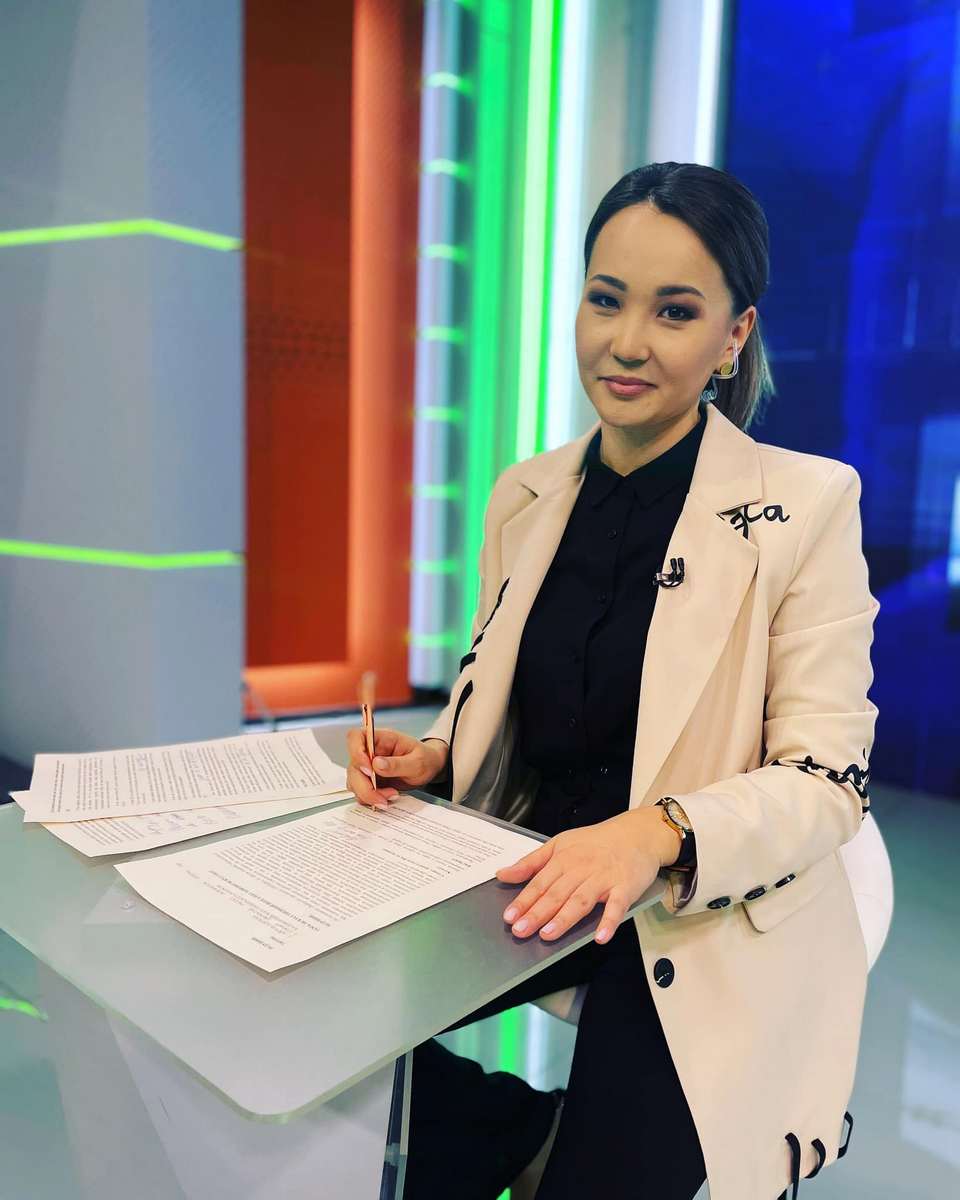
– Leading a year-end program at 18?
Actually, I was in high demand in the local market. I hosted programs, filmed stories, conducted interviews. At the same time, I attended college, and later enrolled in university through correspondence.
– At 15, you went through the casting and ended up on television. How did you find out about the casting? How did it all go? Let’s go back to this first step.
We have a TV channel in our city, “Rika TV,” and there was a scrolling announcement that the entire city reads. I was at home and saw “Teen Program ‘Just Us’ announces casting for hosts and reporters.” There were several rounds, and I was among those who passed the selection. Every Sunday, we went on air, made stories, not understanding what it was, but we were taught. At that time, there were not even computers; we wrote the text on pieces of paper, came up with everything without the internet.
– Did you work behind the scenes?
I worked behind the scenes and also made stories. Teenagers changed, and there was a moment when viewers voted for who they wanted to see that Sunday. The audience already knew and loved me, so thanks to their love, I went on air and hosted the program.
– Do you remember your first broadcast?
Yes, I remember it very well.
– Were you scared to death?
Yes, they put a lot of makeup on me, did a huge tease. At 6 p.m. on Sunday, I went on air for a whole hour; we just chatted. It was too nerve-wracking for me, but they said I did well, and probably, after that, I was never as nervous again, no matter how serious the shootings were.
– At some point, did you become a star, am I understanding correctly? The city is small, the program is popular. How did you experience this?
Everyone in school knew me, whispered about me, looked at me differently, teachers were proud of me and used me as an example. Overall, I always excelled in my studies and was on the honor roll. Besides hosting broadcasts, I remember how our program team organized a concert at the central city stadium, where we were introduced as stars of the “Just Us” program. People gathered, we sang, danced, and signed autographs. And at that moment, standing on the stage, I realized that we were inspiring our peers.
– Were there any fees?
Yes, there were. The most professional and experienced host at that time received around 8,000 tenge. And we got something like 1,500 (equivalent to $3 according to today’s exchange rate), and in the best cases, 3,000. But compared to my earnings as a waitress, who also worked as a cleaner and was paid 1,000 tenge for one shift, it wasn’t that much money. But it was never about the money.
– Was the family proud?
Yes, of course! My parents always took any of my endeavors very seriously. They supported and were proud of me in everything I did. And it continues to this day.
– Where did you go after school?
In 9th grade, I studied and worked. I always took television seriously. I already understood that it was a ticket to my adult professional life.
Entering the 11th grade means that you need to apply somewhere further. In the 9th grade, combining studies with work, I started getting good grades. I realized that I wouldn’t get a gold medal, and I didn’t have the financial means to pay for university education. I chose a college and a specialty where I could combine study with work.
– What did you choose?
I chose the Aktobe College of Oil and Gas. I chose the specialty of a programmer because I thought I had a mathematical mindset. I came to college and said that I would study, but it was very important for me to keep my job.
– Did programming ever come in handy for you?
No.
– You don’t have any relatives in Astana?
No. When I arrived, I thought I was going for a couple of days, would come back, pack my things, and then return for good. But when they left me for a week, I called my mom, and we started thinking about who we knew in Astana. We remembered a distant relative whom we hadn’t spoken to for a long time, and they hosted me for the night. Then acquaintances of acquaintances helped me with a hotel for a couple of days. In the editorial office, I met a guy from Aktobe. He couldn’t accommodate me, but he helped me a lot by showing me where I could stay and even rode the bus with me.
– Could your parents already send money? Did the situation normalize?
My parents sent me, if I remember correctly, 6,000 tenge by mail, which was enough for a bus ticket. There were no train tickets available at that time, so I went to the bus station and spent two days traveling in the scorching heat… Since then, I don’t like buses.
— In which department of “Eurasia” did you work?
At the time when I was invited to work, “Eurasia” was opening its information department. And people like me were being gathered from all over the country. For the first six months, we worked on the format, learned to make stories, each searching for their own style, basically “rehearsing the news.” Before going on air, I had to go on maternity leave and return to Aktobe. In Aktobe, I continued to produce materials for the channel. After my child turned one, we returned to Astana, to the main office. And so I worked at this channel for four years.
— How did your career unfold at “Eurasia”?
At “Eurasia”, I worked as a news reporter, prepared stories for the Sunday program, covered crime news, and then I was assigned to the presidential pool. After four years, I was invited to another channel. And later I moved to another channel, where I became a lead journalist of the presidential pool.
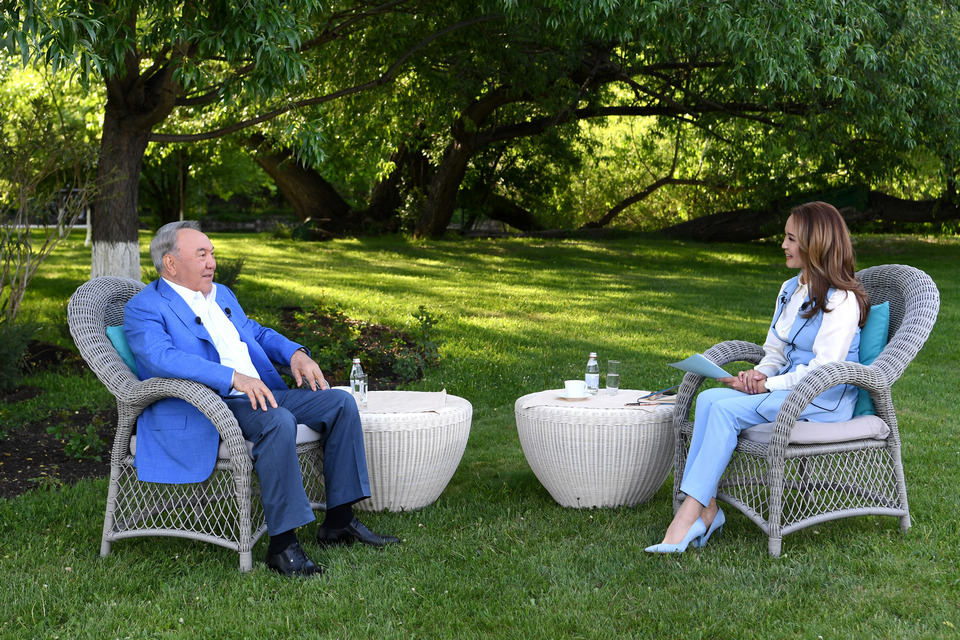
— Which channel did you move to?
To “Khabar,” which is the main state television channel.
— What about the “Kazakhstan” channel?
It is also state-owned, but it is in Kazakh language, while “Khabar” is bilingual.
— How interesting was it to work in the presidential pool, and why were you made the lead journalist?
At “Khabar”, I was invited to the “Investigations Bureau” program, where we conducted journalistic investigations. But I already had experience in the presidential pool. As it often happens, the management noticed me and tasked me with combining journalistic investigations with work in the presidential pool. A lot of work was done through the pool. For five years, I traveled with the head of state throughout the country and the world, several times on behalf of the “Khabar” Agency participated in interviews of the President with representatives of the media. I was also entrusted with conducting exclusive interviews with Nursultan Nazarbayev. So, the final work was my own documentary project based on extensive interviews with Nursultan Nazarbayev. Essentially, it was the first major interview of the First President of Kazakhstan after he left the country’s top post.
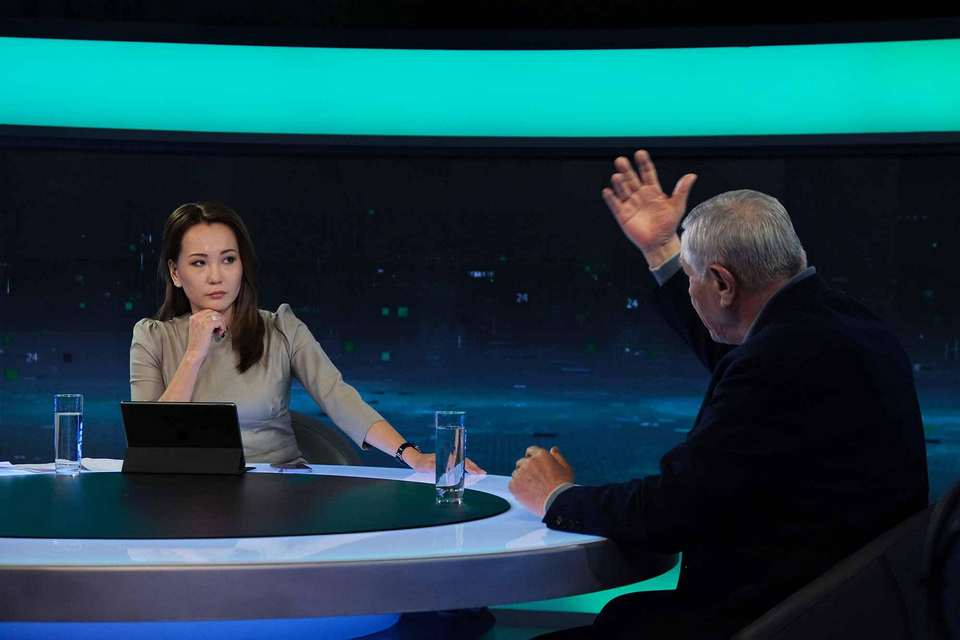
— And how long did you work with him?
Several months.
— Did you experience jealousy from colleagues?
No, I didn’t feel jealousy, on the contrary, I felt support. Even colleagues from opposition publications often told me, “You have your own position, your own opinion, but we respect you for your work.”
— Why, in your opinion, are women so successful in the media in Kazakhstan?
There is no straightforward answer. From my own experience, I can say that I never felt mistrust or discrimination based on gender or age in my profession. On the contrary, I always felt supported. Overall, I don’t see gender divisions in the media.
— What happened after those five years?
During this time, I realized that I needed to grow. After working in the investigations bureau, news programs, analytical programs, both in the field and on air, and in the presidential pool, I was promoted to head of news analytical programs at “Khabar”. Then I launched a public-analytical talk show, which I produced and hosted myself, and overall, I already had significant practical experience to manage news programs.
— You became a media manager, what happened next?
Yes, I became a media manager. I considered it important to develop the genre of journalistic investigations. I often encountered the opinion that state channels do not talk about problems. And I always wanted to prove that we are first and foremost journalists and we also talk about problems in our country. Additionally, I was always concerned about the professional level of our journalists. I wanted to show by my own example how to produce quality content. With my team, we opened a department of journalistic investigations at the “Khabar” channel, which continues to work successfully. Later, I was appointed to perform the duties of the director of the “Khabar” channel, and shortly after, I became the director of the 24-hour news channel “Khabar 24”. After a little over a year, I left this position.
— It’s hard to believe that someone with such enthusiasm, zest for life, suddenly decided to take a break?
Let’s consider it a creative pause.
— How did you cope with it?
Absolutely fine. On the bright side – the phone stopped ringing. And what’s most interesting, I liked it. When I was managing the 24-hour channel, the phone never stopped ringing for a minute. Some people disappeared from my life, and that’s okay too. The main thing is to draw conclusions. For 18 years, I worked continuously, I had no other hobbies, work occupied 99% of my time, I was passionate about my work, I loved television, I felt like a fish in water, I felt that this was my strength. People like me need to conquer new heights. I started traveling, went to Bali, then went to the mountains. For the first time and more than once, I went hiking, I began to explore myself in completely new hobbies, I tried snowboarding for the first time, did many things for the first time. I started getting interested in movies.
— You left, there was emptiness, nobody called. What did you do next?
I’m not the type to wait for something; usually, I take action and do things. It became important for me to create completely new meanings for myself. I pushed work into the background and delved into myself. I went to the mountains, climbed to 3600 meters above sea level, it was my first peak, and what did I see? How petty all our problems are! And the mountains stood for millennia before us, they will stand after us. At that moment, all my complaints about myself, grievances turned to dust. It was a kind of revelation for me, and I wanted to conquer new heights again. I started fulfilling my childhood dreams. My son and I went to Paris, to “Disneyland”. I made a gift for my son, but in reality, it was for myself because I didn’t really have a childhood. Then I went yachting, practicing sailing sports. Soon, I’m going to undergo professional training in mountaineering. And I really like it.
— And the movies you mentioned?
I completed an international screenwriting course at a Russian film school. Now I write various scripts, including scripts for short films and documentaries. That’s how I earn a living. In general, I continue to develop myself. Among other things, I decided to become a volunteer and for almost two months now, I have been holding weekly meetings with high school teenagers on the outskirts of the capital. This school reminds me a lot of my own. I really want to be useful and help the kids who currently need support. I want to be that older adult they can turn to for advice, considering that I have solid life and professional experience. I teach public speaking, self-presentation, organize meetings with professionals, and spend time outside of school. I organized trips for them to a hockey game, to the movies. One boy came up to me after hockey and said that it was his first time at a match and he wanted to become a hockey player. At this age, the right role model is very important. Why not help with that?
— Why don’t you consider blogging? Where you are your own boss, the main customer is the viewer, but you need to win them over.
I’ll say that my creative break is coming to an end. And I’m sure that I will definitely make myself known, but already in a new format for myself and possibly for the audience. I am a responsible person. A word is a big responsibility. In order to convey something to the masses, you must not stop improving and take the best from your professional practice. I think I can do it. Considering that there are still so many unsaid words in Kazakhstani media.
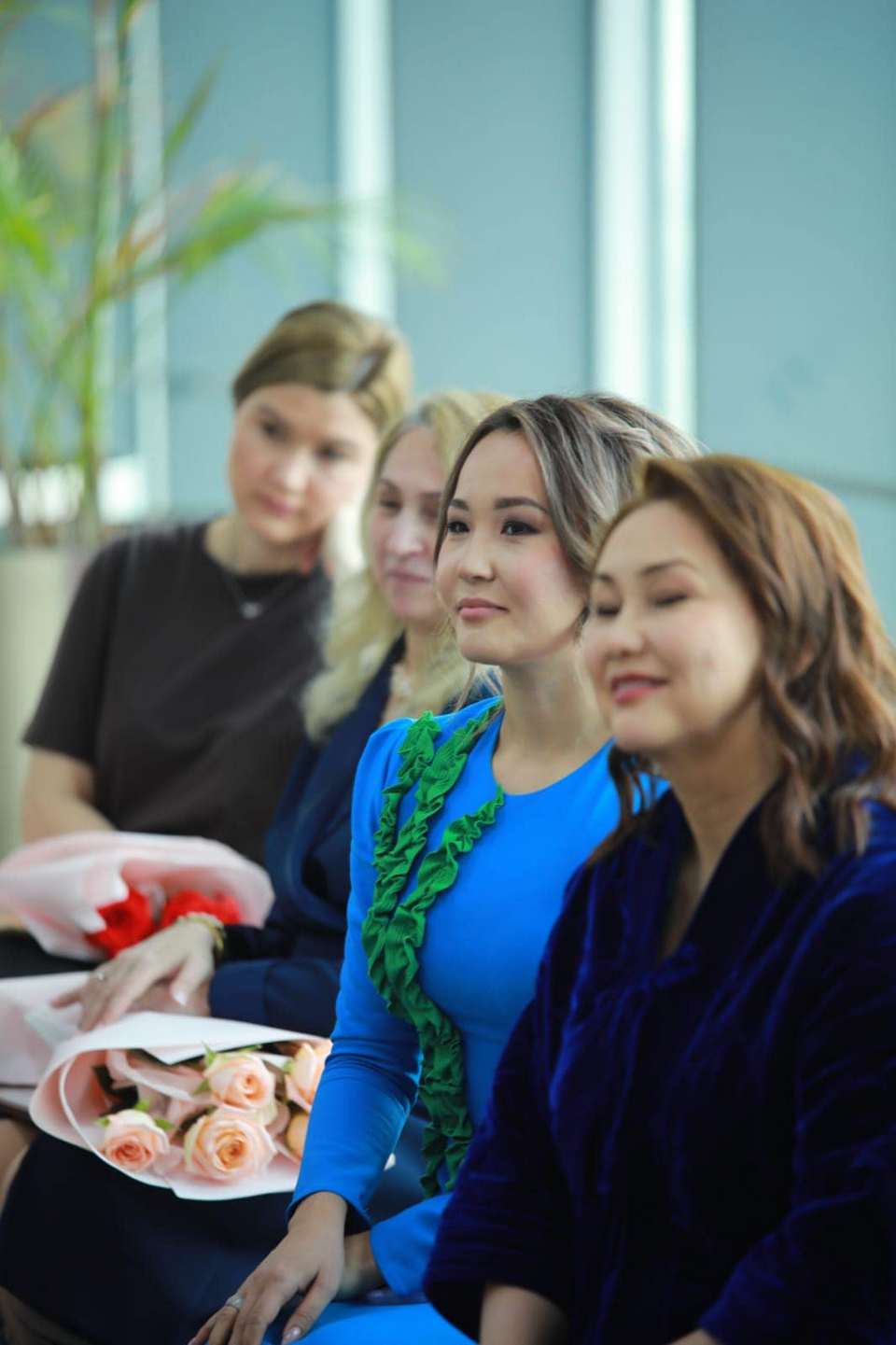
— What is the most important event in your professional career for you?
When I was 16-17 years old, I had a dream that I entered the White House, knocked on the door of the office with the sign “Washington” and planted a tree. I woke up and thought, “Girl, what White House, you haven’t even been to Astana!” And in 2018, I found myself in the White House, attended a press conference by Donald Trump and Nursultan Nazarbayev. Afterwards, I walked through the corridors of the White House, the places where history had been made for centuries, realizing that I myself was witnessing history, and remembered my childhood dream. The dream of a young, but so confident in herself and her own dream girl, the dream of a child who sold pastries on the train at the age of 10 and was afraid to meet classmates. Was it a prophecy? I think so. Now I just need to plant a tree. But already in my homeland. And let it not be just one tree.
